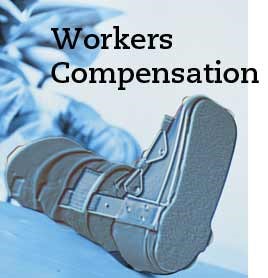
Under the New York State Workers’ Compensation Law, there is a two-tier statute of limitations:
- Pursuant to Section 18 of the Law, you have 30 days from the date of accident or knowing that you have a work-related sickness or illness to report it to your employer (this is called “notice”),
- Pursuant to Sections 28 and 45, you have 2 years from the date of accident or knowing that you have a work-related sickness or illness to file a claim with the Workers’ Compensation Board.
How Does Workers’ Comp Work: Notifying Your Employer
An important part to understanding how Workers’ Compensation works is knowing deadlines for notifying your employer of your work related injury. The timing of when you notify your employer of your work related injury is very important, as it can affect the outcome of your case.
While you must give notice to your employer within 30 days of knowledge of the injury, some employers have a policy that requires almost immediate notice of an injury. The employer may attempt to use your failure to abide by this policy as a reason to deny workers’ compensation benefits. However, this is not controlling under the Workers’ Compensation Law.
How Does Workers’ Comp Work: Who Should You Tell About Your Injury?
Essential to answering the question “How does Workers’ Comp. work?” is knowing who at your workplace you need to tell about your injury. It is not enough to tell a co-worker that you’re injured. Rather, you need to give notice to:
• Someone with authority to take the injury report,
• Your supervisor, or
• Human Resources representative.
How Does Workers’ Comp Work In Terms of How I Should Tell My Employer?
Notice does not necessarily have to be in writing. It can be given orally, although it’s always best to document your injury. Keep in mind that in certain instances, such as being taken away by ambulance, it can be argued that there was an implied or actual notice of the injury.
On the other hand, sometimes people will have injuries or become sick at work and they won’t know exactly what made them sick until sometime later. This is particularly true with occupational disease claims. An example of this type of claim would be someone who becomes sick and has a problem breathing without recognizing that it is a work-related asthma condition until they’ve been evaluated by a variety of medical providers.
Once there is a diagnosis from a doctor that the problem was related to work, it is best to comply with Section 18 of the Workers’ Compensation Law by giving a written notice to your employer. There is no special form to give notice and then to file a claim.
How Does Workers’ Comp Work: How Long to File A Claim
How does Workers’ Comp work in relation to how long you can take to file a claim? You have two years to file a Workers’ Comp claim. This two year limit to file a claim applies to two years from the date of the accident or two years from knowing or should have known, in an occupational disease case.
How Does Workers’ Comp Work in Relation to Who Needs to File A Claim?
Injured workers should file a claim by completing a C-3 Employee Claim. The employer has a similar obligation to report injuries to the Workers’ Compensation Board.
How Does Workers’ Comp Work: Can An Employee File a Claim?
Many people are under the impression that only the employer can report an accident–this is not true. An injured worker or family member can commence a Workers’ Compensation claim on their own.
At MCV Law, it is out opinion that it is best practice to file a claim as soon as you have evidence that you have a work-related injury or illness.
How Does Workers’ Comp Work: Form C-3
Care must be taken when completing the paperwork; while not legally required almost all claims are started using the New York Workers’ Compensation Board forms. To file a claim an injured worker uses Form C-3, called “Employee Claim.”
The C-3 form contains questions about the injury or sickness, as well as biographical information about yourself and your employer. The form should be completed with care, especially the questions dealing with the details of the event or illness, as well as prior injuries or sicknesses.
What is my Employer Supposed To Do?
How does Workers’ Comp work on your employer’s end? The employer should make a report of an accident or sickness on form C-2 “Employers Report of Accident.” This can be done in writing, online, or by calling their insurance carrier. The employer must also complete other forms, which include Form C-240 showing the actual amount of money earned by the employee for the 52 weeks prior to the injury, Form C-11 reporting employee’s lost time from work, and to provide other information helpful to the Workers’ Compensation Board in administering the claim.
How Does Workers’ Comp Work With Help From A Workers’ Compensation Attorney?
This post is intended as an informative introduction for answering the question “How does Workers’ Comp work?” Workers’ Compensation law is complicated, and you risk receiving compensation that may be less than the maximum amount you may be entitled to when trying to navigate Workers’ Compensation without professional legal representation.
There’s a lot more that goes in to fully answering the question “How does Workers’ Comp work?” As your case moves forward, questions will arise in relation to the specifics of your case. Because of this, fully understanding the intricacies of the Workers’ Compensation claim process to benefit injured workers requires extensive experience. For over 30 years, MCV Law’s Workers’ Compensation attorneys have protected the rights of injured workers.
For a free initial consultation, contact us.
William W. Crossett, IV
Partner
Email: crossett@mcvlaw.com
Phone: 315-471-1664
Mr. Crossett concentrates his practice in the representation of Injured Workers. Since 1982, he has regularly appeared before the Workers’ Compensation Board and the Courts of New York. As an advocate for the Injured Worker, he has testified before the New York State Senate and has presented many Continuing Legal Education programs. Presently, Mr. Crossett serves as President of the Injured Workers Bar Association of New York and is an active member of Workers Compensation Law Division of the New York State Bar Association. In 2012, he was inducted as a fellow in the College of Workers Compensation Lawyers. Mr. Crossett practices throughout Central New York with an office in Syracuse.








 Try Our Workers Compensation Benefits Calculator!
Try Our Workers Compensation Benefits Calculator!
